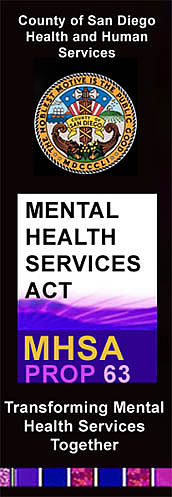MENTAL HEALTH SERVICES ACT • MHSA • PROP 63 |
|
Some of the harmful • LIVING IN DENIAL OF THEIR CONDITION. ...Stigma may stop people from seeking help when they experience mental health difficulties. Those who become concerned about their own mental health or that of someone else they are close to may be reluctant to talk to others about the situation. We are discovering that the negativity and misunderstanding that often surrounds mental health illnesses can create fear and cause shame, which in turn causes unnecessary pain and confusion. These results of stigma can be profound. • STIGMA CAUSE CONFUSION AND KEEPS PEOPLE FROM SEEKING HELP Often people do not want to acknowledge their need for support or simply do not know how to raise the issue with family, friends or health professionals. Many of them do not seek such services because they do not have health insurance and are afraid of being labeled as "mentally ill" or "crazy”. This is a serious problem since early identification and treatment is generally associated with better outcomes. • SOME DISORDERS MAY ATTRACT GREATER STIGMA AND PREJUDICE ...Mental disorders can happen to anyone. A study in the United Kingdom found that schizophrenia, alcoholism and drug addiction attracted the most negative ratings among the public with a high proportion of respondents saying that people with these disorders were unpredictable anddangerous. In regard to clinical depression, a significant proportion of people showed a negative and inaccurate view of this disorder by responding that those with severe depression could simply 'pull themselves together'. • LIVING IN FEAR OF PHYSICAL VIOLENCE, HARRASSMENT, PREJUDICE AND DISCRIMINATION ..Stigma leads to fear, mistrust, and violence. Even though the vast majority of people who have mental health illnesses are no more violent than anyone else, the average television viewer sees three people with mental health illnesses each week, and most of them are portrayed as violent. Such inaccurate portrayals lead people to fear those who have mental health disorders. Many individuals try to prevent people who have mental health illnesses from living in their neighborhoods. Some people also believe that if you have a mental health disorder, you must be dangerous and violent. This perception is often inflamed by media accounts of crime in which someone is vaguely referred to as "mentally ill." Statistics, however, do not bear out a connection between mental health illnesses and violence. In fact, those suffering from mental health disorders are more likely to be a victim of violence than those in the general population. • LACK OF INFORMATION AND INADEQUATE One in four adults and one in five children experience a mental health problem. Ignorance of the services and resources available and the stigma surrounding these misunderstandings, as well as the lack of knowledge, can limit their opportunities. It can stand in the way of a new job, increase feelings of loneliness and cause many other unfortunate outcomes. ...Until the society understands how the stigma and discriminations affects and fuels negative attitudes about mental health problems, then will stop the cycle, the use of labels, the myths and the reality behind the misconceptions. --> Stigma and Discrimination Ends the Hope
|
|
Transforming Mental Health Services Together |
|
Salud+HealthInfo is for information and educational purposes only. You should not rely on this information as a substitute for personal medical attention, diagnosis or hands-on treatment. If you are concerned abut your health or that of a child, please consult your family's physician or health provider immediately and do not try to diagnose yourself. Salud+Health Info is published and distributed free of charge by Info Option Network (ION) Publishing Company. Copyright © 2001-2008 Info Option Network |
|
Bienvenido a la primer revista dedicada al cuidado de la salud
 info
info
The first, the best & the only English & Spanish Magazine in San Diego, California
|
| |
| |
|
| .....Mental Health Services Act .....Prop 63 |
| Overcoming the Barriers in Mental Health |
| Unveiling the Barriers of the Stigma and its Harmful Effects |
| Some of the harmful effects of stigma |
| Stigma and Discrimination Ends the Hope |
| Stigma Can be Reduced |
| Coping with the stress of natural disaster |
| Alzheimer's |
| Parkinson's Disease |


